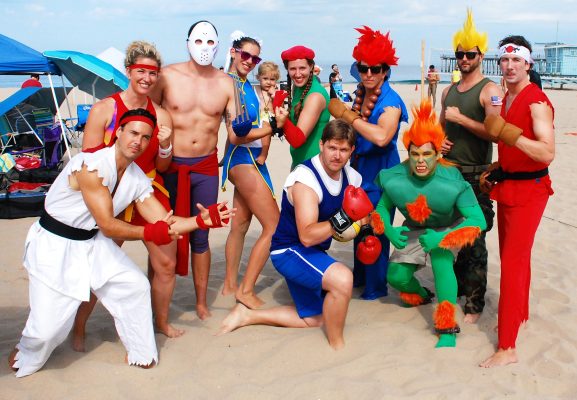Author Matt Sterling recalls navigating the challenging world of New York advertising, in a wheelchair
by Garth Meyer
Matt Sterling worked at LINTAS advertising in New York City. Its offices were in the One Dag Hammarskjold Plaza building, named for the second secretary general of the United Nations.
Sterling was a young assistant media planner, trying to make it in the city, one of 200 people in his department.
On the phone, he spelled out the building’s address for salespeople who wanted to send magazines or other mail to the office.
“I recited this hodgepodge of consonants multiple times a day for the first year or so, until I learned you could write ‘DHP’ and it would still get there,” the Rancho Palos Verdes resident writes in his new memoir, “Mighty: Finding the Strength to Survive.”
It was the early ‘90s. While making his way in advertising, Sterling had the added issue of making his way in a wheelchair, in the snow, on buses and in taxis with limited handicapped access. Among the challenges was preventing the muck his hands picked up from the tires of his wheelchair from transferring to his clothes.
Gloves left black marks, so Sterling quit wearing them and “washed (his) hands constantly.”
“Mighty” is a New York story – in a vein that recalls how Tom Wolfe came to write “The Bonfire of the Vanities.” Wolfe always wanted to write a grand book about contemporary New York, but figured someone was already doing it. He’d wait another five or ten years, and think the same thing. But still nobody had, so one year Wolfe got started.
“Mighty” is like that, but it’s a regular guy’s story, set in the New York of a few years later, at the peak of print advertising and print magazines, and then its fading as online publications took hold. In the midst of this, Sterling switched jobs, from LINTAS to Time, Inc. – going from buying ads for clients to selling ads. One of his Time accounts was IBM. Eventually, in 1999, he became immersed in the digital world so much so that he transferred to San Francisco to launch a new magazine from Time, Inc. called “eCompanyNOW.”
Sterling was a “breech” baby, born in 1969. Doctors had to break both of his legs to bring him out of the womb, leaving him unable to walk without braces. His first school – outside Sylvania, Ohio – was run by what was then known as the Toledo Society for the Handicapped.
The youngest of three children, Sterling soon began to use a wheelchair and was “mainstreamed” before the term came to be. He was often the only disabled kid among the throngs of “AB” – able-bodied – kids at school.
Sterling decided to write his story to fill a gap in the books that he read as a kid.
“It was either a Vietnam veteran or a paralympian, never just a regular, disabled person who got a job and had a family,” he said.
His wife, Carrie, is an American Studies professor at Cal-State Fullerton.
He moved to New York fresh out of the University of Florida. He was offered the LINTAS job during a spring break interview trip to the city.
“Being able to afford fancy clothes, an apartment and the other expenses of living in the city on a meager entry-level media salary gave birth to the saying: ‘Media, a great career if your parents can afford it,’” Sterling writes.
The book tells of getting acclimated to New York in a wheelchair; finding an apartment, taking buses – the subway had few accessible stops – fitting into tiny “bodegas” to get groceries.
“Thankfully, New Yorkers for the most part seemed accepting, or more accurately, they didn’t give a s––,” Sterling writes. “This overall feeling of apathy made me feel like part of the crowd.”
The self-published “Mighty” also tells of Sterling’s expanding role at Time, Inc. He began to fly internationally for the first time, once sitting entirely alone in the non-smoking level of an Air France flight from Paris to Tokyo.
The book attests to Sterling’s unique reality as he looked to advance.
When a veteran Time executive who handled the IBM account was retiring, Sterling thought he had a shot at the promotion. He went to his boss, Time Publisher Jack Haire.
Sterling writes of what he said to him: “My concern is, I would never want my disability or someone’s problem with a disabled person getting in the way of a sale. Almost before I finished voicing my concern, Jack smiled and said, “Mattyboy, some people’s personalities are a disability.”
“Mighty” later gives an inside-the-building view of the infamous 2000 AOL-Time Warner merger and what happened next. One episode involved AOL Communicators, a blue, pager-like device with a tiny keyboard.
“Conversations were usually co-workers taking jabs at the person speaking in the meeting as they droned on about synergy,” Sterling wrote. “At least that is what mine was used for.”
“I began to understand (that) jobs are like the life of a popsicle,” he writes. “ Exciting, cool and delicious to start. Then after a period of time and diligent work, the fun is gone and you are left with a tasteless stick.”
Sterling had moved back to New York when the August 2003 electrical blackout knocked out power throughout the city of elevators. Sterling’s apartment was on the 20th floor. He was ultimately carried to it.
After moving to Los Angeles, he met his wife and became a father.
His biggest trial, he writes, arose from contracting an MRSA (staph bacteria) infection. He details being on life support for four months in the harrowing final section of the book.
“Mighty” is available at Amazon.com or for more information go to www.mightymattsterling.com. Pen











